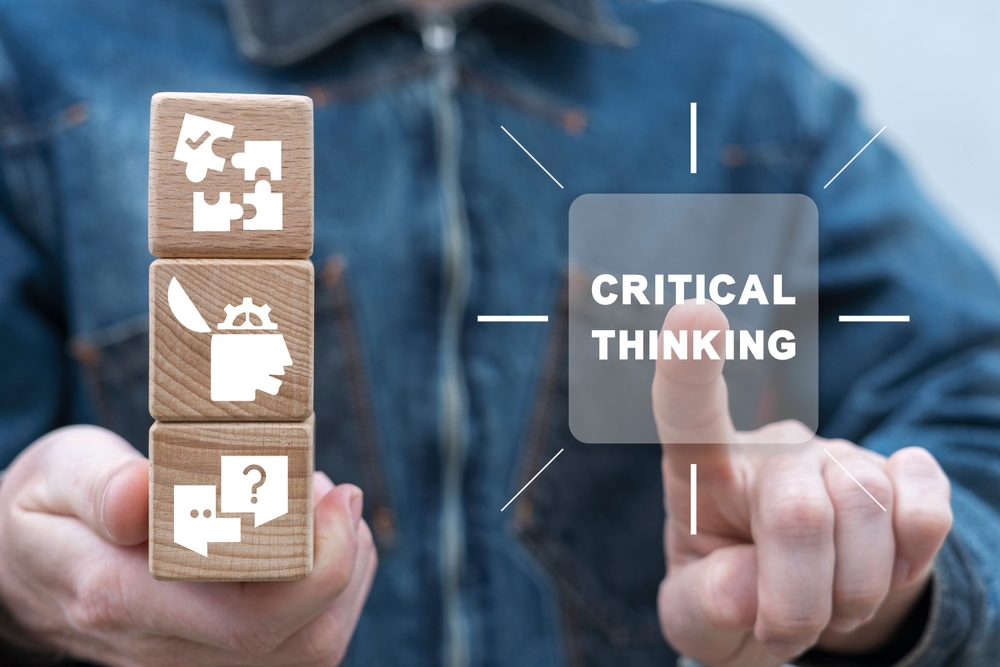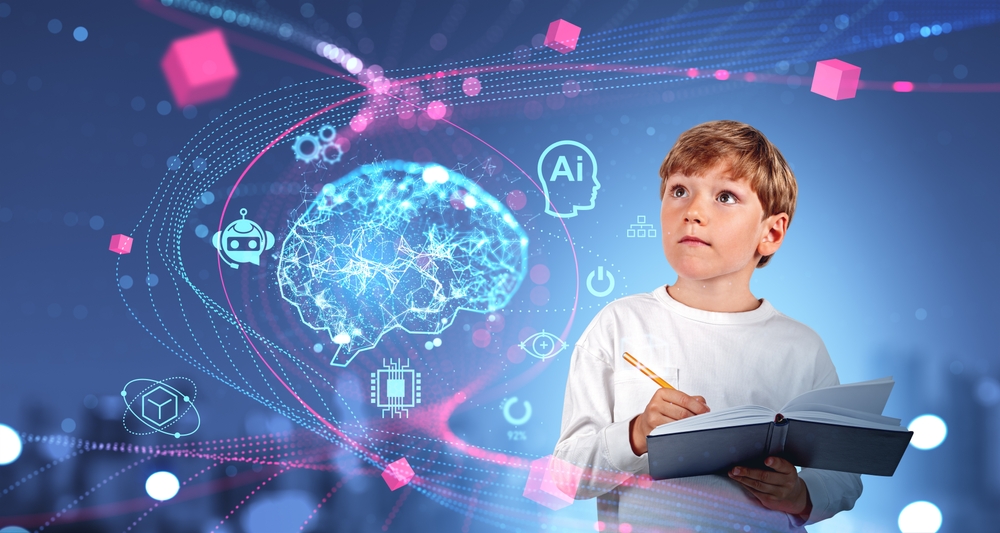In recent years, AI has become a part of everyday life for many of us, whether at work or at home. However, with technology constantly developing, becoming more accessible, and an easier way to get through life, problem after problem keeps popping up—with one key area being the connection between AI content exposure and child critical thinking, among others.
With the creation of generative AI, AI in search engines, and advanced AI algorithms, fears have been spreading around the impact that this new wave of technology will have on our brain function. Whether it’s young children being exposed to AI content and using AI in other ways, or the elderly discovering this magical new world, should we be worried about our critical thinking skills?
What Is AI Content Exposure?

First, what is AI content exposure? This term can refer to many kinds of AI, including generative AI, or even algorithm-based AI. This content can take many different shapes, and is also becoming increasingly difficult to determine if it is actually real or not.
Common types of AI exposure we see on a daily basis:
- Video generated AI content – videos and sounds can be generated through a new app called Sora, via Gemini, ChatGPT, and many more software and sites
- Text-based AI generated content – text can be generated through software like ChatGPT, Frase, and many more
When thinking about the link between AI content exposure and child critical thinking, it’s crucial to understand different types of AI that can contribute to the threat. Unfortunately, there are numerous types of AI content to be wary of, including videos, music, books, art, and text.
Popular examples of AI-generated content across the internet and social media:
- Videos (both realistic and unrealistic, can be incredible dangerous as discerning between the two is becoming increasingly difficult)
- Music (AI-generated music is becoming increasingly popular, with 100% AI even bands listed on Spotify and overtaking the real bands they are inspired from, important to note that intellectual property theft is a big concern here)
- Text (text generated on various AI software make up a large portion of recent blogs and overall online content, raising red flags about accuracy and bias; AI text is also being increasingly used within education)
- Books (many AI books are being published and/or listed, including works of fiction, self-help books, and educational textbooks, once again raising severe concerns about the accuracy and bias of works, particularly of self-help and textbooks, and intellectual property theft regarding books)
- Art (AI-generated ‘art’ can be generated via software, taking real-life art and creating something with the images/pieces it has found on the internet; once again, concerns of intellectual property theft)
How Does AI-Generated Content Differ From Human-Created Content?
With recent leaps in AI technology, being able to distinguish between AI-generated vs human-created content is becoming increasingly difficult. However, there are key details to look out for within text, images, and videos to help—from the type of grammar and sentence structure used, to visual distortions, context, and many inconsistencies.
See below for a more in-depth breakdown of the differences between AI-generated vs human-generated content. Remember—trust your instinct regarding content, and always fact-check before you believe anything you see!
AI-Generated Text | Human-Created Text |
Cannot convey nuance | Human creativity and nuance |
Limited by its algorithm | Limited by knowledge and imagination |
Tendency to produce nonsensical information/sentences | Typically more carefully put together |
Unable to grasp context | Contextually accurate information |
Very frigid grammar and sentence structure | Fluid use of grammar and rule-breaking to convey tone and storytelling |
Frequent use of buzzwords and jargon | Limited use of buzzwords and jargon |
AI-Generated Media | Human-Created Media |
Inconsistencies in shapes, textures, features, angles, colours and more | Consistent shapes, textures, features, angles, colours, and more |
Visual distortion (warped backgrounds, fuzzy textures, overly smooth) | Visually makes sense, and everything looks ‘normal’ |
Contextually inaccurate visuals (e.g. lightning, odd items in the image/video) | Contextually accurate |
Unnatural movement/expressions (look for stiffness, off movements, or either reduced or enhanced expressions) | Natural movements |
Inclusion of nonsensical background noise | Natural sounds |
Can Too Much AI Exposure Affect a Child’s Critical Thinking?

Yes, too much AI exposure can negatively impact critical thinking skills across all ages—with a more severe effect on children and young people. Recent studies (such this one from Gerlich’s in 2025) have shown that there is a ‘significant negative correlation’ between frequent AI tool usage and critical thinking abilities. Similarly, other studies have found the same answers in relation to the use of AI and critical thinking skills, solidifying that this is a very real concern that we should all remember as technology continues to develop.
It is also important to remember that AI exposure and use can go beyond the obvious, as this tool is also used to form algorithms and more. As pointed out within the findings in this study, AI can work as an echo chamber to further reduce critical thinking skills, and feed users blatantly incorrect information—as has recently been shown with AI-generated self-help books being sold on Amazon, and even textbooks—both of which can be incredibly dangerous.
Overall, the link between AI content exposure and child critical thinking is still being studied. The use of AI as we know it today has not been around for very long, and it may take years or decades for psychologists to understand the full extent of using this tool and the impact it has on critical thinking skills and overall brain function. However, while more studies—especially long-term studies—are needed, the evidence already points to AI overuse being detrimental for many cognitive abilities.
Does AI Make Children More Dependent on Technology for Answers?
AI can absolutely make children more dependent on technology for answers, and many answers they come to may not be factually correct. This is important to bear in mind with the addition of AI features like AI Overview, which has been known to give incorrect and dangerous answers to queries. Even in other AI software like ChatGPT, users need to be aware that it is not a search engine, and, while easy to use, will not always give the correct results.
So, while AI might make children more dependent on technology to get the answers they want because of how easy it is to use, it’s worth remembering that even these answers are not necessarily going to be correct.
What are the Potential Benefits of AI in Education?

As with everything, there are some advantages to using AI in education—but parents and teachers should not overlook the potential negatives, either. Benefits might include immersive learning, detailed and instant feedback, and a personalised learning experience, but these are only possible and effective when the AI has the capacity to understand context and nuance for many subjects.
Below are some key possible benefits of AI in education or school:
- Personalised learning experience to boost performance
- Cost-effective learning
- Aids in student engagement
- Fast and simple teaching
- Immersive learning to boost development
- Instant and detailed feedback
How Can Parents and Teachers Encourage Critical Thinking Alongside AI Use?
To prevent the negative relationship we are seeing between AI content exposure and child critical thinking, it’s important to always be sceptical with AI use, not rely on it, do your own fact-checking, and make sure that you challenge your own brain and critical thinking skills every day without the use of AI.
Ways to encourage critical thinking alongside AI use:
- Be mindful of the wording in order to gain knowledge and relevance
- Always do your own fact-checking
- Do not become overly reliant on any kind of AI
- Use the correct software for different purposes (e.g. ChatGPT is not a search engine)
- Encourage scepticism with everything AI-related
- Learn AI literacy (understand how it works, biases, and how to use it responsibly)
- Practise deep thinking (AI lacks depth, use open-ended questions and problem-based learning and studying to encourage critical thinking)
- Always try to solve problems/questions/tasks without using AI
- Limit AI use so that you challenge your own brain
What Balance Should Families Aim for Between AI and Real-World Learning?

Overall, families and education must find a balance between AI and real-world learning by remembering to engage in critical thinking activities while also learning how to make the most of the new technology. Children need to know how to use AI, but cannot become reliant on it. Use AI to complement learning, not replace traditional learning.
The link between AI content exposure and child critical thinking is one that many parents are worried about, so why not do what you can to combat this issue?
Ready to take the next step and help your child exercise their brains and encourage critical thinking? Explore The Brain Workshop for personalised training programs to strengthen critical thinking and problem-solving skills in children. Learn more about us at The Brain Workshop, meet our team, check our events, or even read our FAQ.
Want to learn more? Visit our blogs exploring bed rotting and why your child won’t get out of bed, the impact of doomscrolling and negative news, and the impact of passive habits on the brain.






